May 29, 2025 | 05:22 GMT +7
May 29, 2025 | 05:22 GMT +7
Hotline: 0913.378.918
May 29, 2025 | 05:22 GMT +7
Hotline: 0913.378.918
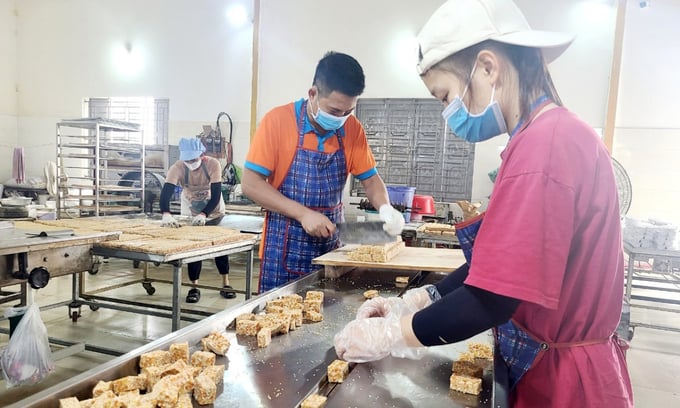
Nguyen Village has been making Cay cakes for over 200 years.
Nguyen village, Nguyen Xa commune, Dong Hung district, Thai Binh province, is famous for making Cay cakes, a product once used to present to the king. Through many historical upheavals, Cay cake products are still handed down, and they survive, develop, and become OCOP products.
Mr. Do Quy Phuong, Deputy Director of the Department of Agriculture and Rural Development of Thai Binh province, said that Cay cakes crystallize the long history of rice. As a critical rice production province in the Red River Delta, Thai Binh has exported products such as clams, garlic, chili... However, Mr. Phuong admitted, the products are still mainly In raw, fresh form, there are not many processed or deeply processed products.
Currently, there are about 2,000 agricultural product processing establishments in the area, but most are small and household-sized. About 1% of these are of relative scale, applying modern, automated lines.
In fact, Cay cakes are classified by the EU as composite products, according to Regulation (EC) 2022/2292, effective from December 15, 2022. The ingredients of Cay cakes include processed fiddler eggs (products of animal origin); sticky rice, sesame, peanuts, ginger... (products of plant origin) and change the characteristics of products of animal origin - fiddler eggs.
The Directorate General of Health and Food Safety, European Commission (DG SANTE) recently disseminated regulations related to composite products in Hanoi. But as Mrs. Sylvie Coulon, senior expert of DG SANTE, said. Regulations on composite products are complex and confusing to even food safety experts.
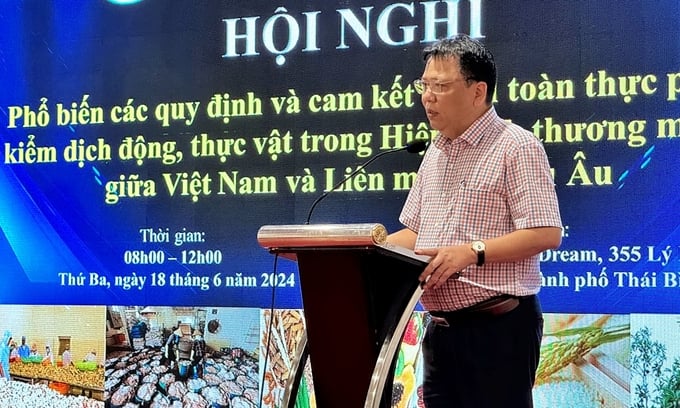
Mr. Ngo Xuan Nam: Cay cake is a delicious specialty but can be exported to the EU if it meets standards such as standardizing raw material sources and monitoring residues...
"How to export Cay cakes", Mr. Ngo Xuan Nam, Deputy Director of SPS Vietnam, asked a question at the Conference to disseminate SPS regulations in the EVFTA on the morning of June 18, within the framework of the event with the Department of Agriculture and Rural Development of Thai Binh province.
According to Mr. Nam, before considering exporting, you must know whether Vietnam can export this product to the EU market or not. This information surprised many delegates attending the Conference because, for a long time, farmers have maintained a production style based on inertia and "selling what they have, not selling what the market needs" (words from Minister Le Minh Hoan).
Going deeper into the story of Cay cakes, Mr. Nam informed that composite products are divided into 3 categories by the EU, which focuses on whether the food reaching consumers needs preservation or not, contains colostrum or processed meat.
"All composite products, including Cay cakes, that want to be exported to the EU must be produced from EU-approved facilities and located in a country that the EU authorizes to export. Those are two factors to keep in mind. "In addition to raw materials that meet standards and are licensed by the EU in the annexes of Regulation (EC) 2022/2292," Mr. Nam emphasized.
Thanks to implementing many measures to inspect and monitor the seafood food safety system, Vietnam can export composite products to the EU. This premise paves the way for Cay cakes to enter a market of more than 700 million people.
Thus, Cay cakes can open up to the EU market. Having this "key," the Vietnam SPS Office believes that all levels, sectors, localities, and businesses need to be responsible for standardizing raw material sources, implementing plans to monitor residues and quarantine, and ensuring traceability and other regulations to bring rice country specialties to Europe.
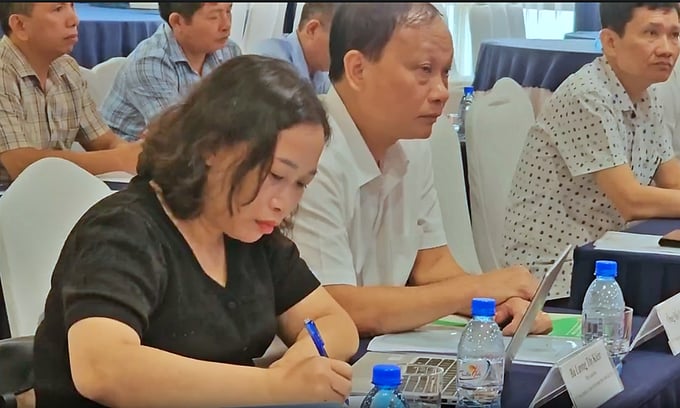
Deputy Director of the Department of Agriculture and Rural Development of Hai Duong and Thai Binh provinces attended the Conference.
Not only Vietnam but most agricultural powers have expectations of increasing processing and deep processing content. Because the group of processed products has high economic value, it can promote the brand and image of a country. Therefore, the EU's new regulations on composite products need even more attention.
Sharing with Vietnam Agriculture Newspaper on the sidelines of the conference, Ms. Luong Thi Kiem, Deputy Director of Hai Duong Department of Agriculture and Rural Development, said that the province currently has about 30 enterprises operating in the field of preliminary processing, processing and export agricultural products, focusing mainly on vegetables, tubers and fruits.
Known as the capital of winter crops in the North, the proportion of domestic consumption of vegetables, tubers, and fruits in Hai Duong is about 30 - 40%; the remaining is for export or consumption in neighboring localities. Therefore, learning and capturing information from export markets through popular conferences deployed by the Vietnam SPS is "very useful", according to Mrs. Kiem.
Vietnam currently participates in 19 FTAs. Key export markets include China, the United States, the EU, and Japan. Vietnam have all signed free trade agreements. That means tariff barriers are almost eliminated. Instead, there is a technical barrier.
Deputy Director of Hai Duong Department of Agriculture and Rural Development also said that it is time for those who direct production in the agricultural sector to firmly understand the importing country's regulations, requirements, and tastes. "Only when we know where the technical barriers are can we return to directing production correctly and successfully," she emphasized.
Ms. Kiem expressed her hope that the Ministry of Agriculture and Rural Development units, including the Vietnam SPS Office, organize more in-depth training programs on agricultural export activities, especially processed and deeply processed products. "Only like that, carrots, cabbage, and Hai Duong green bean cakes will have more added value," she expressed.
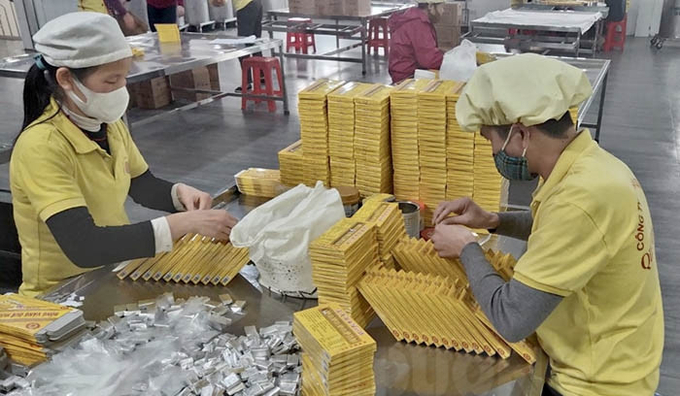
Hai Duong green bean cake products have been exported to many markets around the world.
Recently, the Ministry of Agriculture and Rural Development assigned the Vietnam SPS Office to conduct a popular conference on SPS regulations under the EVFTA and RCEP.
With the participation of the Plant Protection Department, the Department of Quality, Processing and Market Development, the Department of Animal Health, local Sub-Departments, and relevant Ministries and branches, many issues were raised, such as the following: Food safety measures, animal and plant quarantine, regulations on labeling and packaging of agricultural products, quality management of exported agricultural and food products...
In the upcoming third quarter, the Ministry of Agriculture and Rural Development will continue to direct the organization of conferences to disseminate SPS regulations for rice products to promote export value to serve the Project of 1 million hectares of high-quality rice in the Mekong Delta.
In the long term, the Ministry of Agriculture and Rural Development will continue to direct affiliated units to develop and implement a project to improve SPS implementation capacity and, simultaneously, request localities to have a specialized department as an information focal point about export markets.
Deputy Director Ngo Xuan Nam said that through programs to disseminate SPS regulations, Minister Le Minh Hoan and Deputy Minister Tran Thanh Nam expect to hear more opinions from localities. On that basis, the Ministry will have appropriate direction and administration to enhance the value of each industry.
Translated by Huong Giang

(VAN) The import-export turnover between Vietnam and Singapore rose amid a trade rebound, with machinery, electrical equipment, and fuels making up the majority of the transaction value.

(VAN) Director General of the General Administration of Customs of China, Ms. Sun Mai Jun, has pledged to implement measures that will ease the import process for Vietnamese agricultural products.

(VAN) Although Vietnam is still increasing its coffee exports, the industry is currently in the process of determining market strategies in response to the U.S. imposition of reciprocal tariffs.

(VAN) With rising demand in Muslim-majority countries, Halal certification is becoming a critical passport for Vietnamese agricultural products seeking sustainable market access and consumer trust in the Middle East and Africa.

(VAN) Vietnam’s fruit and vegetable exports to the U.S. are rising sharply, and exporters are hoping that any upcoming reciprocal tariffs will be set at manageable levels.
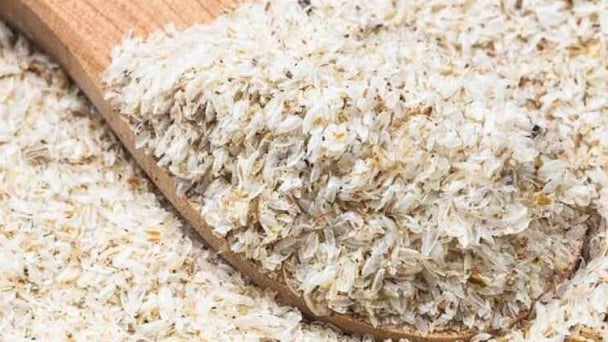
(VAN) Despite meeting quality standards, Vietnamese rice bran exporters still face difficulties with administrative procedures under the new protocol.
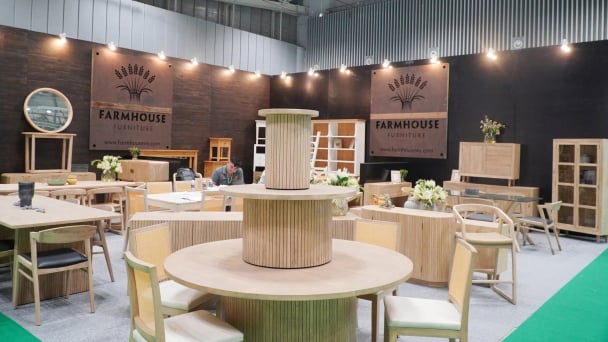
(VAN) The U.S. is tightening import tariffs and origin inspections, requiring Vietnamese businesses to proactively prepare in terms of legal compliance, supply chains, and appropriate export strategies.